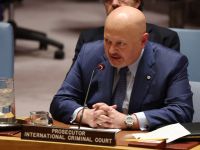A sustained hit-and-run campaign against the Lebanese Army in the country’s north is aimed at distracting it from the battle against terrorism and ensuring safe access for the militants, a senior military official said Friday.
Military posts were attacked by unidentified gunmen for the second day running Friday as Army chief Gen. Jean Kahwagi said ISIS wanted to secure safe access to the sea.
“The attacks on military posts are aimed at denting the Army’s battle against terrorism and exerting pressure on troops to provide the terrorists with safe access,” Kahwagi told The Daily Star. “But these attacks will not weaken the Army’s determination to carry out the mission assigned to it in fighting and destroying the terrorists.”
Masked gunmen on motorcycles opened fire on Army posts in the northern city of Tripoli overnight, security sources said.
Gunmen armed with machine guns stormed three Army posts in the Tripoli neighborhood of Bab al-Tabbaneh around midnight, prompting soldiers to return fire, the sources told The Daily Star. The Army fanned out across Bab al-Tabbaneh in the search for the assailants.
Later, an unknown assailant also tossed a hand grenade along the city’s Abu Ali River in Tripoli overnight, the sources said.
The Army confirmed the attacks, saying in a statement that soldiers returned fire after gunmen opened fire on a military checkpoint in Talaat al-Omari in Bab al-Tabbaneh.
It said assailants also tossed two hand grenades on Syria Street, which runs parallel to the Abu Ali River, in Bab al-Tabbaneh at 4:30 a.m. The added that there were no casualties.
The security incidents have threatened to destabilize Tripoli, which has enjoyed relative stability since the implementation of a government-backed security plan in the spring.
The attacks on military posts are apparently in response to the Army’s decision to tighten the noose around ISIS and Nusra Front militants entrenched in the rugged outskirts of the northeastern town of Arsal.
Friday’s attacks came a day after one soldier was killed and another wounded in Rihaniyeh, in the northern Akkar province, when gunmen opened fire on them as they headed for duty. The Army also came under fire near the Syrian border in the north, and gunmen inside a Syrian refugee camp near the northeastern town of Arsal also shot at troops.
The Army fought pitched gunbattles with ISIS and Nusra Front militants in Arsal in early August. The militants are still holding at least 21 soldiers and policemen hostage after releasing seven and killing three.
But Khawagi said ISIS and Nusra Front were still holding 27 Lebanese servicemen captive, warning that the jihadists were seeking to gain access to the sea through Lebanese territory. In an interview published Friday in the French daily Le Figaro, he warned that ISIS was working to inflame sectarian strife in Lebanon, counting on support from sleeper cells in Tripoli and Akkar.
“ISIS is relying for support on dormant cells in Tripoli and Akkar, in addition to certain political forces in the Sunni community [to achieve their schemes],” Kahwagi said.
“The Army succeeded in repelling the militants [in Arsal] and pushing them back to the mountains,” he added. “Had they succeeded in their schemes, a civil war would have erupted in Lebanon.”
Kahwagi said the Army had dealt painful blows to the militant groups in the Arsal area but its action remained restrained because of the hostage crisis.
“We should be very careful [given] that we still have 27 personnel still in their hands,” he added in the first official count of the number of hostages.
Kahwagi said ISIS wanted to have safe access to the sea, “a matter that it could not achieve either in Syria, or Iraq, but thinks it could be possible in Lebanon.”
He argued that the jihadist group was seeking to link its positions in Syria’s rugged Qalamoun region on the eastern border with Lebanon with the coast through Arsal and the Akkar region.
Kahwagi said the Army needed to bolster its Air Force to enable it to combat militants more effectively. “We are short of helicopter gunships and aerial support for our ground forces. We have managed to equip our Puma helicopters, which were previously provided by France, with rockets, but we need more sophisticated arms,” he said.
The Army commander is due to leave for the United States next week for talks on military aid to the Lebanese Army, the military official said.
The official acknowledged that a soldier, identified as Mohammad Antar, had defected from the Army on Oct. 3. Earlier Friday, the Nusra Front claimed that the defected soldier had joined the ranks of the jihadists.
Meanwhile, officials have assured the families of the captive soldiers that the government was working to secure the release of their relatives.
General Security chief Maj. Gen. Abbas Ibrahim, tasked with following up on the hostage crisis, met with a delegation of the captives’ families Friday to update them on the negotiations to secure the hostages’ release.
“They reassured us that our children would not be killed and that they would bring them back,” a relative told reporters, referring to Ibrahim and Maj. Gen. Mohammad Kheir, of the Higher Relief Committee, who also attended the meeting at the Grand Serail.
Separately, Imad Ayyad, a Hezbollah fighter who was reportedly captured by Nusra, appeared in a video saying he was in fact being held hostage by the rebel Free Syrian Army.
An FSA commander, Abu Fidaa, confirmed to The Daily Star that Ayyad had been captured four days ago in the town of Assal al-Ward. “The FSA is waiting for a call from Hezbollah to arrange a prisoner exchange” Abu Fidaa said.
By Hussein Dakroub








